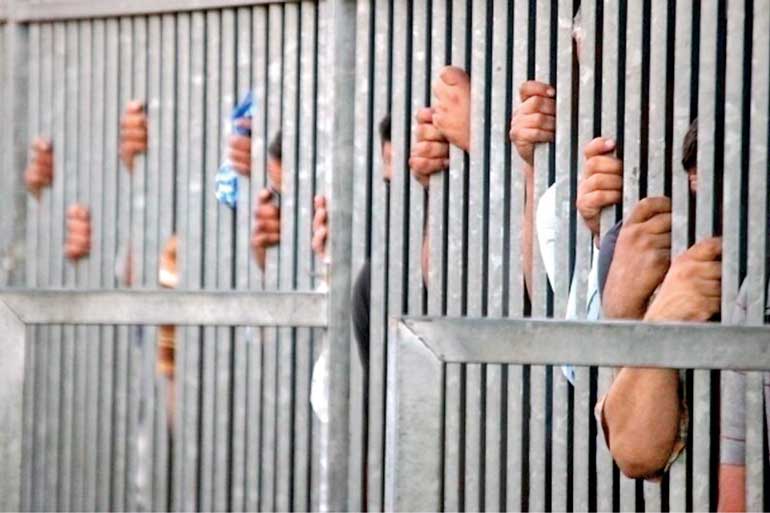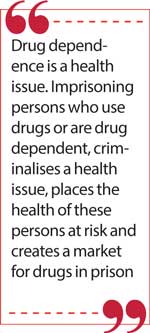Monday Apr 07, 2025
Monday Apr 07, 2025
Thursday, 30 May 2024 00:26 - - {{hitsCtrl.values.hits}}

The impact of the operation on respect for the rule of law and the protection of human rights has been adverse
 Minister Alles and Deshabandu Tennakoon, the Inspector General of Police (IGP), have repeatedly proclaimed the success of Yukthiya (means justice in Sinhala), the anti-drug operation they launched in December 2023. The facts say otherwise.
Minister Alles and Deshabandu Tennakoon, the Inspector General of Police (IGP), have repeatedly proclaimed the success of Yukthiya (means justice in Sinhala), the anti-drug operation they launched in December 2023. The facts say otherwise.
As of 22 May 2024, 113,974 persons have been arrested as part of Yukthiya, with the majority of such persons released soon after arrest either after being fined or on bail. Releasing most arrested persons within a few hours of arrest demonstrates that the intent is to create the illusion of effective government action to address drug trafficking by showing a high number of arrests. However, most of the arrested persons are drug users, many of whom are drug dependent, and not drug traffickers.
This is evidenced by the paltry amount of narcotics seized during Yukthiya, which is a drop in the ocean of drugs trafficked: only 68.1 kg of Heroin and 71.8 kg of ICE in five months. The amount of seized narcotics mentioned in police statements is however larger because they include the amounts seized at sea as part of routine patrol operations, such as 121.4 kg of Heroin and 189.6 kg of ICE seized since December 2023, as part of drugs seized during Yukthiya.
Harm caused by criminalising drug use and compulsory drug treatment
According to statistics released by the Department of Prisons, in 2023, 48.2% of persons in pre-trial detention were remanded for drug offences, while those convicted for drug offences constituted 62.2% of the prison population. It might appear that a large number of persons have been convicted for drug offences, which in turn is likely to create the impression that persons who traffic and sell drugs have been convicted. The reality however is different. In 2023, 67.8% of persons in prison were incarcerated because of their inability to pay a fine, the sentence for which ranges from less than a month to six months.
It is not a coincidence that the length of the sentence of 93.9% of persons convicted for drug offences in 2023 was also under one month to six months. This shows that most of those arrested for drug offences possessed small user quantities of narcotics, were fined and were imprisoned due to their inability to pay the fine. Hence, these persons were imprisoned because of a health condition (drug dependence) and poverty (inability to pay the fine), and not because they trafficked drugs.
Drug dependence is a health issue. Imprisoning persons who use drugs or are drug dependent, criminalises a health issue, places the health of these persons at risk and creates a market for drugs in prison. This is corroborated by the 2022 Report of the Auditor-General’s Audit of the Department of Prisons which states, “Most of the inmates involved in drug offences are drug addicts, so they try to get the required amount of drugs in any way, and to prevent such situations the prison officials have to pay more attention and due to the lack of human resources, it has also hindered the internal security and functioning of the prison.”
As documented in the report of the national study of prisons published by the Human Rights Commission in 2020, drug dependent persons that are imprisoned are subjected to violence, even resulting in death, as prison officers are not trained to deal with a person experiencing withdrawal symptoms. Nor is medical intervention to alleviate their symptoms and suffering provided in prison.
As evidence, both in Sri Lanka and globally, shows, compulsory drug treatment does not work. In Sri Lanka, such compulsory treatment is not evidence based, does not involve medical interventions or harm reduction; it is instead abstinence based. A person can be sent to compulsory drug treatment by a police officer without a judicial order only based on the report of a Government medical officer. The statement by the Bureau of the Commissioner General for Rehabilitation that, in the future, only persons who are medically certified as drug dependent will be sent to compulsory treatment is acknowledgment that even the current process, which violates due process safeguards and human rights standards, is not being followed.
 Persons sentenced to compulsory treatment are first sent to prison where, in 2018–2019, they spend up to 7 days before being sent to the Kandakadu rehabilitation centre.
Persons sentenced to compulsory treatment are first sent to prison where, in 2018–2019, they spend up to 7 days before being sent to the Kandakadu rehabilitation centre.
The period spent in prison increased substantially according to the 2022 Auditor General’s report, which states that 1,271 persons sentenced to compulsory treatment had spent more than six months, i.e. more than half of the time they were sentenced to rehabilitation, at Welikada prison.
In March 2024, Minister Alles announced the establishment of 256 community-based drug rehabilitation centres. According to the National Dangerous Drugs Control Board (NDDCB) the ‘treatment programme is (sic) developed by NDDCB based on the guidelines provided by the UNODC and WHO’. It is however not yet clear whether the centres will also admit those sent for compulsory treatment and whether the treatment will involve medical intervention and harm reduction. The most concerning factor about these centres is that the Sri Lanka Police will play a “crucial role in ensuring providing all the infrastructure facilities, food and other required facilities in most of the camp models”.
Instead of being led by the evidence and heeding the advice of medical professionals, human rights experts and the United Nations, and providing evidence based, voluntary treatment, the Government is exploring increasingly abusive and punitive measures, such as constructing new prisons and rehabilitation centres on the isolated island Mantheevu in the Eastern Province.
Enabling injustice
The impact of the operation on respect for the rule of law and the protection of human rights has been adverse.
There have been several reports of persons who were arrested or sent to compulsory drug treatment several years ago being re-arrested during Yukthiya even though they had no drugs in their possession at the time of arrest. A lawyer representing one such person said that his client had stopped using drugs several years ago and was in gainful employment when he was arrested a couple of months ago.
There have been complaints of the police violating due process during arrests, of cavity searches as well as strip searches in public, and abuse of children. The searches have targeted mainly poor neighbourhoods during which police officers commonly use abusive language and even damage property. The privacy of persons subjected to searches have also been violated as at times the police have been accompanied by news crews that record and telecast the searches. The IGP too has participated in the operations and has been filmed interrogating arrested persons in public places.
Statements by Minister Alles criticising lawyers that appear for persons arrested for drug offences further undermine basic principles that underpin the judicial process, such as the right to legal representation which is a core element of the right to fair trial. The Minister has several times also endorsed the extra-judicial use of lethal force through statements such as telling the police to ‘stop fondling weapons” and issuing warnings that those involved in organised crime will be “hunted down” since he has instructed the Special Task Force “to use everything in their power to eradicate this menace”. The IGP similarly has stated that he is ‘ready to answer criminals in a language they understand”. These public declarations display scant regard for the judicial process and instead endorse the use of violence outside the boundaries of the law.
The Minister of Justice is no different. For instance, he has dismissed complaints of violations during the Yukthiya and stated that those whose houses are damaged during Yukthiya should approach the courts or the Human Rights Commission for redress. The refusal of officials holding high public office to hold the police accountable and their contempt for basic legal principles and fundamental rights enshrined in the Constitution demonstrate deeply entrenched impunity that has allowed public officials to violate rights without facing consequences.
The fact Minister Tiran Alles has stated that “everyone knows about the action I have taken against those found misusing their uniform”, while endorsing a man the Supreme Court found had violated the fundamental right not to be tortured of a citizen, to hold the position of IGP, is evidence of the contempt the Minister has for the rule of law and for the rights of Sri Lankan citizens.
The President too is complicit in these violations as he allows them to be committed unchecked and enables the military to be used in these operations. For instance, in March 2024, the police announced they would be obtaining the assistance of the army during Yukthiya. While the military has been (extra-legally) involved in drug control and treatment for many years, this public acknowledgement by the Government of military involvement is another means of attempting to normalise the militarisation of drug control and treatment. The legal basis for military involvement in Yukthiya likely emanates from Section 12 of the Public Security Ordinance which empowers the President to call out the armed forces to maintain public order and bestows them with powers to arrest and detain.
The President can call out the military every month ad infinitum by only issuing a gazette, which does not require parliamentary approval and hence is not subject to any oversight. Section 12 was used intermittently by President Chandrika Kumaratunge, then President Mahinda Rajapaksa, and after the Easter attacks by President Sirisena, and was continued uninterrupted by President Gotabaya Rajapaksa and now President Ranil Wickremesinghe.
Non-state actors also enable the violations committed during Yukthiya, perhaps unwittingly. For instance, the media disregards the presumption of innocence by reporting that “Thousands of drug dealers and organized criminals have been arrested”. This assumes that those who are arrested have been found guilty of an offence by a court of law and labels drug users/dependents as criminals. Even civil rights advocates lack awareness about drug dependence as demonstrated by a lawyer working on the rights of incarcerated persons stating he has no objection to drug users being targeted during the operation.
Based on the above facts, a question that requires an urgent answer is, what is the real purpose of Yukthiya?
Discover Kapruka, the leading online shopping platform in Sri Lanka, where you can conveniently send Gifts and Flowers to your loved ones for any event including Valentine ’s Day. Explore a wide range of popular Shopping Categories on Kapruka, including Toys, Groceries, Electronics, Birthday Cakes, Fruits, Chocolates, Flower Bouquets, Clothing, Watches, Lingerie, Gift Sets and Jewellery. Also if you’re interested in selling with Kapruka, Partner Central by Kapruka is the best solution to start with. Moreover, through Kapruka Global Shop, you can also enjoy the convenience of purchasing products from renowned platforms like Amazon and eBay and have them delivered to Sri Lanka.
Discover Kapruka, the leading online shopping platform in Sri Lanka, where you can conveniently send Gifts and Flowers to your loved ones for any event including Valentine ’s Day. Explore a wide range of popular Shopping Categories on Kapruka, including Toys, Groceries, Electronics, Birthday Cakes, Fruits, Chocolates, Flower Bouquets, Clothing, Watches, Lingerie, Gift Sets and Jewellery. Also if you’re interested in selling with Kapruka, Partner Central by Kapruka is the best solution to start with. Moreover, through Kapruka Global Shop, you can also enjoy the convenience of purchasing products from renowned platforms like Amazon and eBay and have them delivered to Sri Lanka.